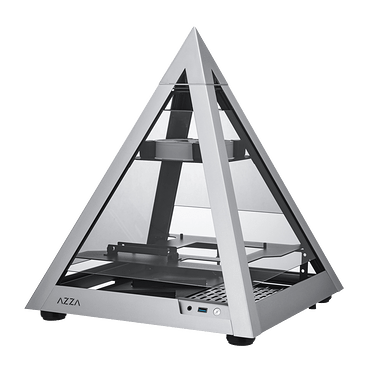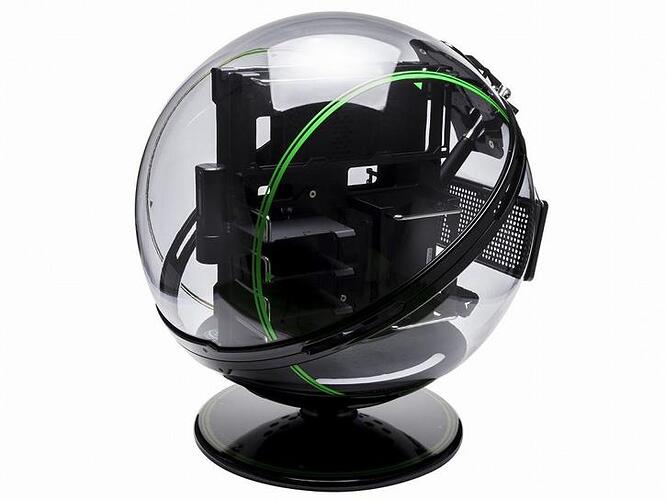This also has been covered numerous times before. You’re confusing digital with analog. I’ll leave it at that.
This like bars on your phone this doesn’t mean anything other than the strength of the RF signal the p is getting, which whilst it can have an affect on bandwidth doesn’t indicate you have good or poor bandwidth. Lower strength tends to result in connectivity issues more than anything else as it drops and reconnects due to so much interference. I can be sat waiting for my train on one platform and I have full bars and 5g yet I get no data connection at all until I leave the station.
My desktop PC is very sexy. You have a near infinite amount of variability on PC designs than a one off design.
Yes, I’ve posted some of the amazing case designs that are available. But, I don’t see any here dropping multiple thousands on a computer case alone. Here’s one I’ve been interested in seeing IRL.
“Sexy” is in the eye of the beholder. Many audio fans have to share a house with their spouse , My wife for certain doe not consider a standard desktop as sexy
If a computer could be made invisible it would suit her just fine . The whole WAF thing. ![]()
My visible hi fi in the lounge comprises a tiny NUC and a Naim Unity Atom HE. I just about get away with it . Speakers went the way of the world as we prepared to sell the house !!
When I retired she bought me a pair of HD800 and an Eames Chair just to keep me quiet ![]()
I use Roon in two countries because I have homes in both. I am not going to shell out the big money that a Nucleus requires (twice). So I purchased inexpensive reconditioned Intel i5 notebooks in both countries, both with 16 gigs of RAM and small SSDs. Both have external SSDs attached for my music library (and before they became cheap, hard drives), although I normally stream with Qobuz and Tidal
One laptop is running my Roon core with Windows 11, the other with Linux. Both are used only for Roon and are wired to the network. Networks in both homes are reasonably complicated, with many Roon endpoints (I am mainly a headphone and DAC-amp guy) and a series of non-Roon-related switches, wifi access points and in one case mesh. Both homes also have Sonos speakers throughout for casual listening, often used with Roon.
Everything works very well in both locations. I won’t pretend I haven’t had to overcome an issue or two, but nothing huge and nothing recent. I also enjoy the ability to be able to access my Roon setup on notebook screens instead of only through Roon remote apps.
I can’t think of any reason to buy a Nucleus in either location.
Just a slight remark to say that if you use a NUC (also affordable) you can use your notebook as a remote, in addition to the phone and/or tablet. I use a NUC and the phone/ipad/notebook as remotes and find it very convenient. I agree on the notebook screen being a very pleasant way to operate Roon. Cheers
Since we’re doing shapes, this one is pretty cool and opens automatically on powered hinges! 「BRO」4K PC BUILD InWin Winbot This A Man's Dream? Don't rush to go, Dreams Are Behind.迎广Winbot #pc - YouTube
I got rid of all the HDMI and analog devices by changing BIOS settings. Don’t remember exactly which and where, can’t / won’t check now with no monitor and keyboard close to the ROCK unit…
This was posted as a reply to my comment earlier. It is a great article. I said that computers have no effect on sound quality. @Jdjung responded posting this article, saying computers DO effect sound. Actually the article finds no problem with computer hardware, but that Windows distorts the sound if you implement DSP or let the computer volume change the signal amplitude, or many other sound processing functions. There are solutions if you are running Roon on Windows, and these solutions are described in the article. So, if you have Windows you must fine tune the system. If you have Linux you don’t have these problems but just to have linux requires a different kind of setting up. See this link @Jdjung provided.
Windows audio distortions
“Fine tune” is a bit of an overstatement. All you need to do is use WASAPI in exclusive mode or ASIO.
It’s not that you need to do special things to a system to run Roon, it’s that you might want to be able to do things other than run Roon on the same server. For the price of a Nucleus, I built a silent computer that runs Roon, REW, and acts as a fast file server.
Totally agree. My laptop works as an LMS server and a NAS.
I can do it for cheaper.
It depends on what you want. I built a Core I7 box with a 500gb m.2 drive for the OS, a 1tb m.2 for music files, and 2 4tb SSD’s for file storage, all in a fanless case with fanless power supply. A pretty nice mb with 2 ethernet connections. The parts cost what they cost. There are cheaper ways to do it but no spinning parts and a case nice enough to put in an audio rack was what I wanted.
I think fanless things are overrated. If you want power, you need a fan - and you want a fan, for your peace of mind. It doesn’t have to be solid state all the way.
My Mac Mini has a fan. It works but I haven’t heard it kick in a single time. My Mini is happily sitting in my hifi cabinet in the living room.
I can hear hard drives running and even “quiet” fans become noticeable after a year or two. I could just put the server in a different room(and did before I built this one) but I wanted it on the rack and I wanted dead silence so that’s what I did. It’s not for gaming or cpu intensive tasks. It runs Roon DSP easily and for file serving it’s as fast as dedicated NAS boxes that are more expensive. The case has full length heat sinks on both sides and the CPU temp stays quite cool after hours of streaming with dsp.
Are these computers you’ve sourced parts and built yourself, or, pre-built computers. There is a world of difference between the two as there are parts, even as lowly as a fan, that are worlds ahead of what is put into named brand pre-built machines. Same goes with power supplies. Most users here have no idea just how far advanced a real computer power supply is compared to the brick used with a NUC or those included with pre-built HP Dell, etc. computers.
Example, Noctua CPU fans which cost about 60 to 100 USD a fan, are whisper quiet years after install. Their Case fans run about 35 USD a fan.
I can hear hard drives too sometimes, but it doesn’t bother me. Fans do need replacement if they become noisy. I’ve done it a few times before, they’re not expensive.
Mine is much faster that any NAS I had. I added a cheap 2.5G USB Ethernet dongle to the laptop, as the network was the bottleneck. With gigabit, the theoretical max transfer rate is 125MBps. I have two hard drives in RAID0 and they can easily exceed 200MBps. Also, the ability to use NTFS instead of EXT is a plus for me, as I had troubles with the 1-second file time resolution during backups.
I have been building my own PC’s for 25 years. I have had this same argument on an audio forum. My last PC build was all Noctua fans and SSD’s. Over 7 years I replaced three case fans as they started to make noise. Not screaming like bearing failure, they just started being clearly audible like a cheap fan. The CPU fans required cleaning out dust accumulation at least annually. Fanless=0 maintenance and zero sound.
If there was absolutely no advantage to a fanless PC, there would not be a market for them. Yes, it costs more. Yes, thermal performance is limited. But if dead silence and no cleaning is the goal, they are the solution. Whisper quiet? You can hear a whisper and late at night when the lights and music are low, I don’t want to hear it. Others post about their PC’s with fans that they never notice. Great. I’m not telling you to buy a fanless PC. I have never encountered a fan cooled PC with spinning hard drives that I couldn’t hear running in a quiet space. The Noctua build was almost there but required maintenance to keep it that way.

